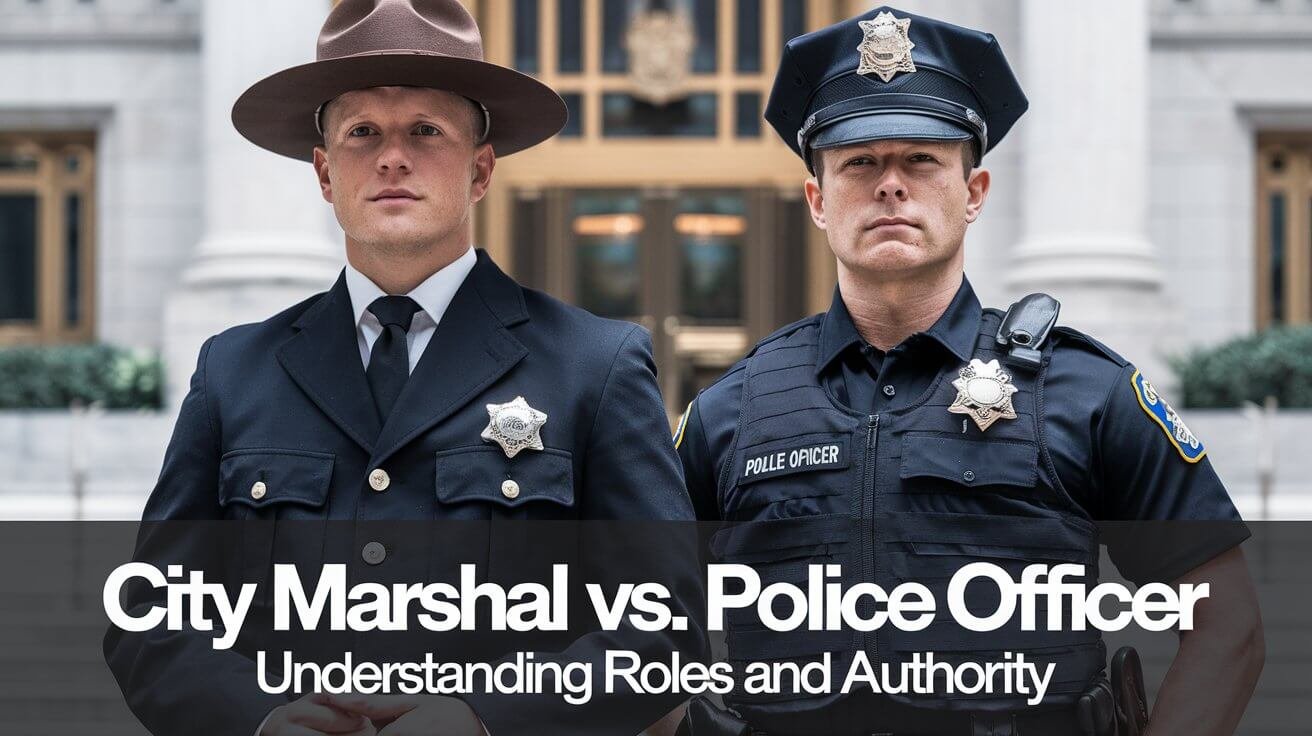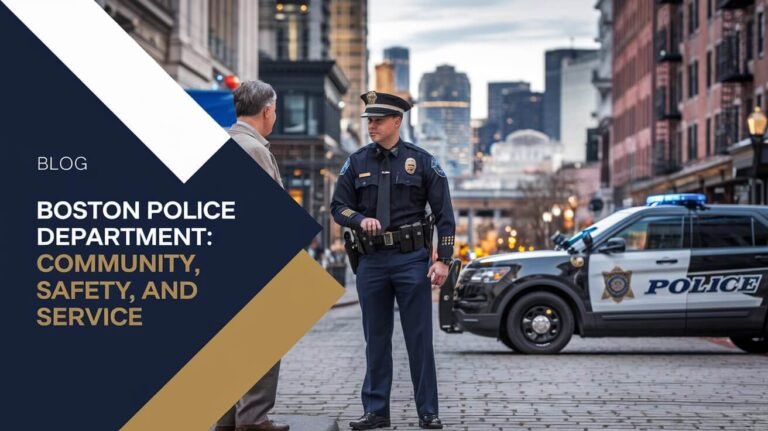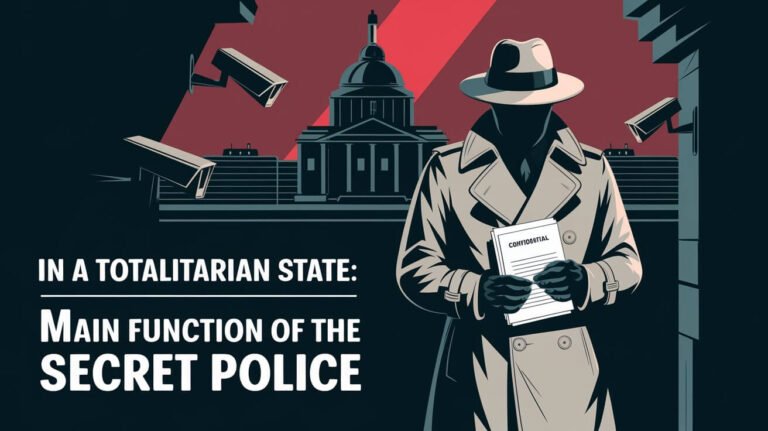City Marshal Vs Police Officer: Roles & Authority Compared

City marshals and police officers are key parts of law enforcement. But they have different roles and duties. Police officers work for city governments, counties, or states. City marshals, on the other hand, are elected officials for counties or cities.
Their jobs are not the same. Their areas of work, tasks, and powers differ. This leads to different ways of dealing with the public and keeping order in their areas.
City Marshal Vs Police Officer: Duties and Responsibilities
City marshals and police officers work together to keep everyone safe and follow the law. But, they do different things in different places. Police officers mainly look after people and places, go on patrols, and help when needed. They can arrest people and serve warrants in their area.
City marshals have a special job. They serve papers, keep courts safe, and manage jails. They can also serve warrants, but their area of work might be different. For example, City Marshals in Las Vegas work with the Las Vegas Metropolitan Police Department in the city. This shows they share the job of keeping the area safe.
Patrol and Community Protection
Police officers are always on the move, watching neighborhoods, and answering emergency calls. They keep things calm, stop crimes, and make sure everyone is safe. The Operation S.A.F.E.R. program helps make tourist areas safer by checking calls, crime rates, and more.
Legal Authority and Jurisdiction
City marshals and police officers have different powers and areas to work in. Police officers cover a bigger area, while city marshals focus on specific tasks. The Fusion Center at the Southern Nevada Counter Terrorism Center helps find and stop threats. This makes places safer.
Warrant Execution Powers
Both city marshals and police officers can serve warrants. But, how they do it might be different. The Criminal Investigations unit works on solving crimes and gathering evidence. They also check for threats against city buildings.
City marshals and police officers do some of the same things. But, they have different jobs and areas to work in. This helps keep communities safe and well-protected.
| Characteristic | City Marshal | Police Officer |
|---|---|---|
| Primary Duties | Serving papers, court security, jail management | Patrolling, responding to calls, making arrests |
| Jurisdiction | Specialized within city limits | Broader geographical area |
| Warrant Execution | Yes, within specific procedures | Yes, with broader authority |
| Community Engagement | Collaborating with police on local initiatives | Direct interaction with residents and businesses |
Salary Ranges and Career Advancement Opportunities
If you’re looking into law enforcement careers or want to become a public safety official, knowing about salaries and career growth is key. Town marshals make an average of $39,763, which is more than patrol officers’ $35,621. But, salaries can really differ.
Town marshals can earn between $30,000 and $51,000 a year. Patrol officers make between $27,000 and $46,000. Salaries change based on where you work, how long you’ve been doing it, and any special training you have.
| Position | Entry-Level Salary | Experienced Salary | Maximum Earning Potential |
|---|---|---|---|
| Police Officer | $81,552 | $89,854 (after 30 months) | $139,419 |
| Corporal | N/A | N/A | $146,390 |
| Sergeant | N/A | N/A | $157,176 |
| Lateral/Certified Officer | $81,552 | $81,552 – $139,419 | $139,419 |
Advancing in law enforcement careers depends on where you work and the department’s structure. You can move up from patrol officer to corporal, sergeant, and more. Each step brings more responsibility, leadership, and better pay.
The highest-paid state for patrol officers is North Dakota. The best-paying job for law enforcement is in government. Good benefits like sick leave, vacation, and retirement plans also add to the package.
Educational Requirements and Training Protocols
City marshals and police officers have different educational paths. This reflects their unique roles and areas of work. City marshals often have an Associate Degree (35%), while police officers usually have a Bachelor’s Degree (43%). Many choose to major in Criminal Justice. California State University – Long Beach is a top choice for those in law enforcement education.
Both city marshals and police officers need special training protocols. These programs include classroom learning, hands-on practice, and field experience. The specific requirements depend on the jurisdiction and department.
Professional Certification Requirements
City marshals and police officers also need professional certifications. These show they are ready for their jobs. Some common certifications include:
- Peace Officer Standards and Training (POST) certification
- Specialized training in firearms, crisis intervention, and de-escalation
- Certification in emergency medical response (EMR) or emergency medical technician (EMT)
Ongoing Training Standards
Both city marshals and police officers must keep their skills sharp. They do this through ongoing training and professional development. This includes regular firearms training, de-escalation techniques, and updates on laws. The specific training protocols and schedules vary, but the goal is to keep officers ready to serve their communities well.
| Training Requirement | Timeframe |
|---|---|
| Airport security training for airport officers | 90 days |
| Training course for custodial officers | 90 days |
| High Technology Crimes training for city police officers at supervisory level | 18 months |
| Radar operator training | 24 hours |
| Sexual Assault Investigation training | 6 months |
| Specialized investigator basic course for welfare fraud investigators | 3 years |
“The training and education of our law enforcement officers is crucial in ensuring they are prepared to serve and protect our communities effectively.”
Jurisdictional Authority and Enforcement Areas
Law enforcement officers work within specific areas. Police officers usually cover cities, counties, or states. City marshals work at the county or city level. U.S. Marshals have federal jurisdiction but don’t replace local authorities.
Different areas mean different jobs for law enforcement. Local police officers meet citizens first and handle many tasks. City marshals focus on court duties like serving warrants.
| Jurisdiction Type | Enforcement Areas | Primary Responsibilities |
|---|---|---|
| City/Town Police | Municipal boundaries | Community policing, responding to calls for service, investigating local crimes |
| County Sheriff | County-wide | Enforcing state laws, serving legal documents, patrolling unincorporated areas |
| State Police | Statewide | Enforcing state laws, assisting local agencies, investigating serious crimes |
| U.S. Marshals | Federal jurisdiction | Apprehending federal fugitives, protecting the federal judiciary, transporting federal prisoners |
Law enforcement areas affect their work and cases. Knowing these areas helps everyone. It ensures good community policing and crime handling.
Demographic Distribution in Law Enforcement Roles
The U.S. law enforcement landscape is diverse, with many different roles. In 2020, the U.S. Department of Justice reported that 61% of federal law enforcement officers were white. Another 21% were Hispanic, and 10% were Black.
Looking at gender, city marshals are mostly men, with 96.2% being male and 3.8% female. Patrol officers, however, have a more even split, with 82.9% male and 17.1% female.
Age and Experience Factors
The average age for both town marshals and patrol officers is 40. This shows a workforce with a lot of experience. But, different regions can have different ages and experiences.
Regional Employment Patterns
Diversity in law enforcement is seen in regional employment patterns. Even though law enforcement demographics differ by region, the goal is the same. It’s to provide civilian oversight and keep the public safe.
| Demographic Characteristic | Town Marshals | Patrol Officers |
|---|---|---|
| Gender (% Male) | 96.2% | 82.9% |
| Gender (% Female) | 3.8% | 17.1% |
| Racial Representation (% White) | 71.6% | 59.8% |
| LGBT Representation | 7% | 7% |
| Average Age | 40 | 40 |
“Advancing Diversity in Law Enforcement” was a critical initiative that helped identify barriers to diversity and promote equal employment opportunities in the law enforcement profession.
Essential Skills and Core Competencies
City marshals and police officers need many skills to serve their communities well. A 2018 Bloomberg study found that employers value interpersonal skills more than grades. This shows how important “soft skills” are in the criminal justice field.
Skills like empathy, active listening, and conflict resolution are key for law enforcement. Timothy Roufa, a law enforcement expert, says officers need to use their cognitive and emotional intelligence. Skills like nonverbal communication and critical thinking are also vital.
Improving these soft skills can lead to better interactions with the public. In job interviews, candidates might face scenarios to test their communication skills. These soft skills help enhance the quality and performance of their work in the criminal justice sector.
Most-Asked Questions
What are the key differences between city marshals and police officers?
City marshals and police officers are both law enforcement. But they have different roles and duties. City marshals are elected officials working for county or city governments. Police officers are general law enforcement for various governments.
Their jobs and how they interact with the public differ. This affects their role in keeping the peace.
What are the primary duties and responsibilities of city marshals and police officers?
Police officers protect citizens and public places. They patrol areas and help with emergencies. They can arrest people and serve warrants.
City marshals have a specialized job. They serve papers, provide court security, and manage county jails. Both can serve warrants, but their areas of authority differ.
How do the salary ranges and career advancement opportunities differ between city marshals and police officers?
Town marshals earn an average of $39,763, more than patrol officers’ $35,621. Town marshals’ salaries range from $30,000 to $51,000. Patrol officers make between $27,000 and $46,000.
Career growth depends on the place and department’s structure.
What are the educational requirements and training protocols for city marshals and police officers?
Town marshals often have an Associate Degree (35%). Patrol officers usually have a Bachelor’s Degree (43%). Both often study Criminal Justice.
Professional certifications and training vary by place and department.
How do the jurisdictional authorities of city marshals and police officers differ?
Police officers work in cities, counties, or states. City marshals work at the county or city level. US Marshals have federal authority but don’t override local duties.
The area they work in affects the cases they handle.
What are the demographic trends in the city marshal and police officer professions?
Both town marshals and patrol officers are 40 on average. Town marshals are mostly male (96.2%), while patrol officers are more evenly split (82.9% male, 17.1% female).
White people make up 71.6% of town marshals and 59.8% of patrol officers. 7% of both groups identify as LGBT.
What are the essential skills and core competencies required for city marshals and police officers?
Town marshals need skills in patrol, law enforcement, and safety. Patrol officers focus on customer service and safety too. Both must handle emergencies, write reports, and know law enforcement.
They must also drive well and keep the public safe.






